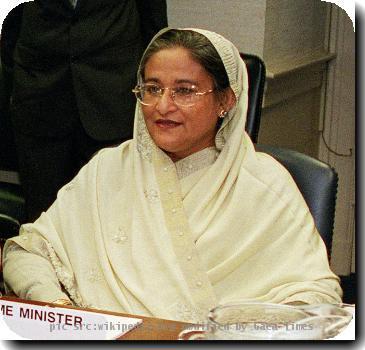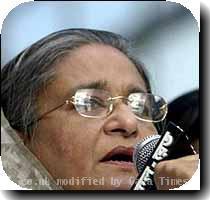War crimes trial not closed, Dhaka tells Islamabad
By IANSSunday, February 28, 2010
DHAKA - Bangladesh has disputed Pakistan’s claim that the issue of trying those who killed unarmed civilians during the run-up to Dhaka’s freedom in 1971 was closed after the 1974 tripartite agreement the two nations signed with India.
Preparing to try hundreds of Islamists who sided with the then Pakistan regime, Dhaka wants Islamabad to “apologise” and try 195 Pakistan Army personnel accused of what it calls “war crimes”.
These soldiers were among the 93,000 Pakistani prisoners of war (POWs) in India’s custody and were repatriated to Pakistan after the India-Pakistan Agreement signed in Shimla, India in 1972.
Prime Minister Sheikh Hasina’s government has said it would try “war criminals” and foreign Minister Dipu Moni reminded Pakistan of its role last week when she received new high commissioner from Islamabad, Ashraf Qureshi.
Qureshi’s contention that the issue was ‘resolved’ after the Shimla Agreement and the 1974 tripartite Delhi Agreement has revived the long-pending controversy between the two countries.
Qureshi’s diplomatic response that the trials were “an internal matter” of Bangladesh has not helped.
Law Minister Shafique Ahmed Saturday alleged that the Pakistan high commissioner in Bangladesh violated the diplomatic norms by interfering in Bangladesh’s internal affairs.
He said the Bangladesh-India-Pakistan agreement signed in 1974 was “no bar to trying the war criminals of Bangladesh”, United News of Bangladesh (UNB) news agency reported.
“It (the 1974 agreement) has no relevance to the holding of trial of the Bangladeshi citizens who had committed offences against humanity like killing, looting, arson and repression of women in 1971,” said the law minister.
The Hasina Government is preparing to try Islamists, including top leaders of the Jamaat-e-Islami Bangladesh, the country’s largest Islamist party, charging them with organising armed groups who attacked sympathisers of the freedom movement, the mainly Hindu religious minority, writers and artists.

